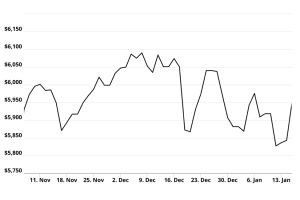With a little more than a week till the projected “X-date,” the day the Treasury runs out of cash, effectively forcing the U.S. to default on its debts, fears of an impending stock market crash are running hot. Indeed, economists and analysts everywhere are ringing the emergency bell over the potential repercussions should the country fail to raise the debt ceiling in time.
Most experts agree equity markets would take a nasty tumble in the face of a debt default. Indeed, in such a case, credit rating agencies would most likely immediately downgrade the U.S.’s credit rating. This would elevate interest rates across the board, effectively crushing demand in the country as unemployment rises due to elevated costs.
However, the world of stocks may be an afterthought compared to the broader economic deterioration.
Bigger Problems Than Just Stocks
According to Brookings Institution analysts, a default would disrupt financial systems far and wide.
“Worsening expectations regarding a possible default would make significant disruptions in financial markets increasingly probable… such financial market disruptions would very likely be coupled with declines in the price of equities, a loss of consumer and business confidence, and a contraction in access to private credit markets.”
Moody’s analysis shows even a brief default would lead to a notable drop in real GDP and a rapid rise in unemployment: “If Treasury securities are no longer perceived as risk-free by global investors, future generations of Americans would pay a steep economic price.”
The question remains, where do lawmakers stand regarding debt ceiling negotiations?
Stock Market Crash Fears Surge as Congress Scrambles to Raise Debt Ceiling
House Speaker Kevin McCarthy and President Joe Biden are the two major faces of the current debt ceiling crisis. The two have been in a sort of cat-and-mouse back and forth for the better part of the past five months since the U.S. first went past its debt limit in January.
While it seemed negotiations were coming along well early last week when the two held several meetings to discuss the terms of debt ceiling legislation. However, one of McCarthy’s top negotiators on Friday confirmed little progress had been made.
“It’s time to press pause because it’s just not productive,” Rep. Garret Graves told reporters after a meeting between the two parties last week. According to the lawmaker, negotiations had become “just unreasonable.”
Reasonably so. McCarthy, representing Republicans, has levied numerous conditions for conservatives to go along with any debt-raising legislation Biden may sponsor. This includes sweeping spending cuts and work requirements for certain social security programs.
On the other hand, Biden has attempted to get a debt ceiling deal passed with little to no concessions to the Democrats’ agenda, an effort in futility thus far.
With only days left until the Treasury Department exhausts its so-called extraordinary measures cash balance, the two titans of the debt crisis are putting their negotiations in overdrive. Whether this will be enough to avoid the country’s first-ever debt default remains to be seen.
On the date of publication, Shrey Dua did not hold (either directly or indirectly) any positions in the securities mentioned in this article. The opinions expressed in this article are those of the writer, subject to the InvestorPlace.com Publishing Guidelines.




